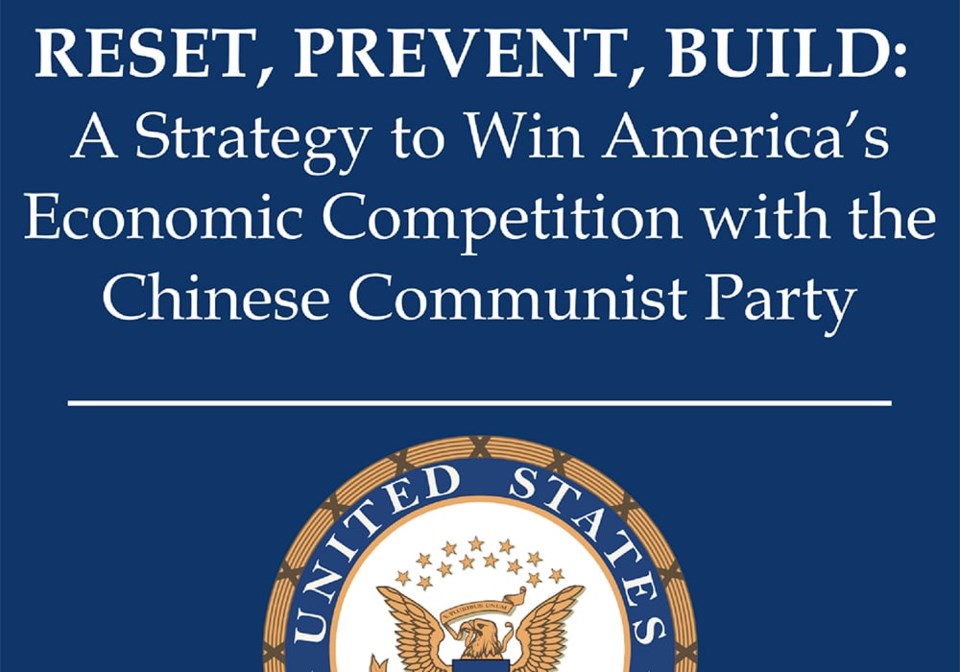SASKATOON — There is talk of another trade war brewing between the United States and China, but for now it is only rhetoric, says a trade expert.
A select committee of the U.S. Congress wants to start an economic war with China and American farmers could be the first casualties.
The House Select Committee on the Strategic Competition Between the United States and the Chinese Communist Party (CCP) has released a 53-page report calling for a “reset in the terms” of the U.S.’s economic relationship with the country.
The committee says for a generation the U.S. bet that robust economic engagement would lead the CCP to open its economy and financial markets, liberalize its political system and abide by the rule of law.
“Those reforms did not occur,” the committee stated in its report titled: .
“The (CCP’s) consistent failure to meet its WTO obligations and its systemic and widespread state and party intervention in market decisions, economic coercion, IP theft, cyber-attacks, forced labor, lack of basic transparency, and the rule of law, have harmed U.S. industry, workers and manufacturers.”
The committee offered nearly 150 recommendations on how to reset the relationship, including moving China to a new tariff column that “restores U.S. economic leverage” to make sure China abides by its trade commitments.
It is reminiscent of former U.S. President Donald Trump’s 2018 trade war with China that eventually led to the 2020 Phase One agreement between the two nations, where
China promised to import more U.S. goods but eventually fell well short of its targets.
U.S. farmers received US$23 billion in government aid during the trade war as compensation for temporarily losing access to the Chinese market because of retaliatory duties.
That massive subsidy program upset other agricultural exporting nations such as Canada.
The committee is anticipating that China would once again retaliate by slapping tariffs on U.S. agricultural exports if its policy recommendations are adopted.
It said the U.S. Department of Agriculture and U.S. Trade Representative (USTR) should collaborate on determining alternative markets for U.S. agriculture exports that predominately rely on the Chinese market.
“Congress should also consider additional appropriations to offset retaliation for farmers and ranchers, U.S. exporters, and other American workers,” it stated.
Carlo Dade, director of the Canada West Foundation’s Trade and Investment Centre, has been .
“What they are proposing is a really good political soundbite and it will get you on the news back home,” he said.
But the first thing to know about the select committee is that it doesn’t have nearly as much clout as a standing committee. It makes recommendations for standing committees to ponder.
Dade said those recommendations wouldn’t sit well with the House Committee on Agriculture or other sectors highly dependent on trade with China.
Therefore, he doesn’t think much will come of the report. But he was intrigued that the committee went as far as proposing that the USDA should prepare to write some more cheques to farmers.
And it is a sign that trade tensions are once again mounting between the world’s two largest economies.
The select committee also urged the USTR to launch a comprehensive WTO dispute in conjunction with a broad coalition of countries against “China’s subsidization, support for state-owned enterprises and non-market economic policies and practices.”
Dade said it is laughable that the U.S. is criticizing China for breaking WTO rules because the U.S. “laps the field” in that regard.
He said China does not break the rules. It prefers instead to bend them to the breaking point.
“China is exceptionally good at following the letter of the law, while walking all over the spirit of the law,” said Dade.
Canada has had its own , tempered by the reality that Canada is far more trade dependent than the U.S. and is not the world’s largest economy.
“We can’t pull the same sort of Mickey Mouse stuff that the Americans pull,” said Dade.
“We’ve got to be a lot more careful.”
Contact [email protected]
Bookmark SASKTODAY.ca, Saskatchewan's home page, at this link.




